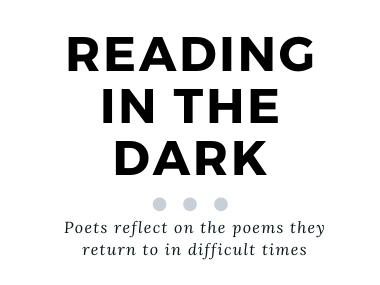Reading in the Dark
Rigoberto González on Elizabeth Bishop’s “The Fish”

The Fish
I caught a tremendous fish
and held him beside the boat
half out of water, with my hook
fast in a corner of his mouth.
He didn't fight.
He hadn't fought at all.
He hung a grunting weight,
battered and venerable
and homely. Here and there
his brown skin hung in strips
like ancient wallpaper,
and its pattern of darker brown
was like wallpaper:
shapes like full-blown roses
stained and lost through age.
He was speckled with barnacles,
fine rosettes of lime,
and infested
with tiny white sea-lice,
and underneath two or three
rags of green weed hung down.
While his gills were breathing in
the terrible oxygen
—the frightening gills,
fresh and crisp with blood,
that can cut so badly—
I thought of the coarse white flesh
packed in like feathers,
the big bones and the little bones,
the dramatic reds and blacks
of his shiny entrails,
and the pink swim-bladder
like a big peony.
I looked into his eyes
which were far larger than mine
but shallower, and yellowed,
the irises backed and packed
with tarnished tinfoil
seen through the lenses
of old scratched isinglass.
They shifted a little, but not
to return my stare.
—It was more like the tipping
of an object toward the light.
I admired his sullen face,
the mechanism of his jaw,
and then I saw
that from his lower lip
—if you could call it a lip—
grim, wet, and weaponlike,
hung five old pieces of fish-line,
or four and a wire leader
with the swivel still attached,
with all their five big hooks
grown firmly in his mouth.
A green line, frayed at the end
where he broke it, two heavier lines,
and a fine black thread
still crimped from the strain and snap
when it broke and he got away.
Like medals with their ribbons
frayed and wavering,
a five-haired beard of wisdom
trailing from his aching jaw.
I stared and stared
and victory filled up
the little rented boat,
from the pool of bilge
where oil had spread a rainbow
around the rusted engine
to the bailer rusted orange,
the sun-cracked thwarts,
the oarlocks on their strings,
the gunnels—until everything
was rainbow, rainbow, rainbow!
And I let the fish go.
"The Fish" from Poems by Elizabeth Bishop. Copyright © 2011 by The Alice H. Methfessel Trust. Publisher's Note and compilation copyright © 2011 by Farrar, Straus and Giroux. Reprinted/Used by permission of Farrar, Straus and Giroux.
In response to the Coronavirus pandemic, we asked poets to write about the poems they return to in difficult times—to find solace, perspective, or even a moment of delight. Subscribe to the PSA newsletter for more Reading In The Dark responses and to keep updated with the PSA.
The poem I keep returning to in times of distress or agitation or loneliness is Elizabeth Bishop’s “The Fish.” Each time that fish reminds me to look outward instead of withdrawing further into despair. It challenges me to find beauty while confronting something quite unpleasant. And to see past the surface of my dark emotions in order to observe my everyday surroundings with renewed appreciation and clarity. These last few weeks, I’ve been rereading that poem periodically. Soon after, that ceramic virgin on the mantle—the blue and purple flowers on her dress regale me; those trees across the street—I come close to the window, they greet me with the same enthusiasm as the day before. When the heaviness of the world appears to be crushing me, I remember that fish, war-scarred yet resilient, unhindered by the weight of the entire sea on its back.
—Rigoberto González
Rigoberto González is the author of five books of poetry, most recently The Book of Ruin, published by Four Way Books. His twelve books of prose include two bilingual children's books, the three young adult novels in the Mariposa Club series, and the memoir Butterfly Boy: Memories of a Chicano Mariposa, which received the American Book Award from the Before Columbus Foundation. He is professor of English and director of the MFA Program in Creative Writing at Rutgers-Newark, the State University of New Jersey.

